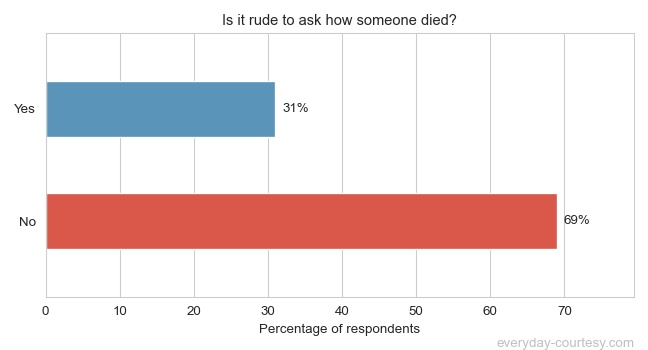When you hear that someone who you’ve known for years has died, you could experience a range of emotions. These include confusion, anger, and grief, which can even make them question the way that they look at life.

While trying to cope with what you’re feeling after learning of their death, you might ask questions. You may want to know when the person died, who was with them at that time, and how they died. However, is it rude to ask how someone died?
Our Survey
Our US-based survey showed that of 103 respondents, 69% thought that it was not rude to ask how someone died. Asking questions is a normal response to loss, and people of all ages often wonder why the death occurred in a particular context.

Asking these questions is part of the process of dealing with grief. Both children and adults will try to understand how they could have come to lose someone who they care about.
Let Children and Teens Know that Questions are Okay
If a grandparent, aunt, or another relative has died, even toddlers might have questions. They want to understand what has happened to their relative and as their parent or guardian, you’ll need to explain it to them in language that’s appropriate for their age. In some cases, this may involve avoiding details that may frighten the child or make them even more confused.
Teenagers may experience anger when a loved one dies but they may not always express their feelings directly. Some may be hesitant about asking questions, so if they do ask, try not to shut them down. This can lead to them bottling up their emotions inside and those feelings may be expressed in an unhealthy way later on.
School-age children who are six to 12 years old are usually interested in the specific details of the death. [1] They will ask questions about how the person died, whether they were sick before, whether they were in pain, and so on.
Children should be taught that it’s okay to express their emotions and ask questions that help them to deal with these emotions.
Negative emotions aren’t wrong. However, emotions should be expressed healthily. Likewise, questions should be asked appropriately and teenagers who are old enough to understand can learn how to time their questions so that they have space to talk through the issues that are affecting them. [2]
While these questions are understandable for a child who has lost someone to who they were close to, it’s important to teach children that if they have questions about a stranger, they shouldn’t immediately ask that person’s loved one. Children should be taught that sometimes these questions can be hurtful and that there’s a correct time and place for asking questions such as these.
Filling in the Gaps
Death can sometimes be harder to bear if it was not expected. For example, if a young person in their twenties suddenly dies, it can be a little more difficult for their loved ones to cope with it, than if someone who is 105 passes away. Both losses are painful but in the case of the older person, their loved ones have had time to come to terms with several factors which could have eventually led to death.
In the case of a young person, it can be harder to understand that they’re no longer with their loved ones on Earth.
People will want to know what happened and why it happened, especially if they were close to the person but hadn’t seen them in a while. By asking questions, they hope to fill in gaps in knowledge that leave them feeling confused or devastated.
They hope that by getting answers, they can come to terms with what happened.
Making Sense of Death in the Workplace
When a coworker has died, it may sometimes be necessary to discuss the cause of death. For example, if they were injured on the job and died as a result of that, it’s not rude to ask what happened.
You have to tread with caution if your coworker died at home and you’re not particularly close to their family. If the family has shared that they’ve died but they haven’t disclosed the cause of death, asking may be seen as prying.
They’re not obliged to share that information with the workplace and might not be comfortable doing so.
Why do some people think it’s rude to ask?
Some people think it’s rude to ask because that is such a sensitive issue. No one wants to ask questions that cause unpleasant emotions or open old wounds.
This is particularly true in cases where an individual may have died violently. Even repeating what has happened can cause a relative or friend to experience the trauma again. Even if they’ve made a little progress with dealing with the loss, hearing questions that remind them of how their loved one died can almost put them right back at square one.
This is why some individuals think it’s better not to ask how someone died. If necessary, they’ll try to find out later on, after those close to the decedent have had time to process what has happened.
In other cases, they may simply ask someone who is not that close to the deceased emotionally but is aware of the facts of the situation. Some may simply decide that it is not their business to know how the death occurred. However, they still pay their respects.
Sometimes when a person is well known in their community or their country, people who aren’t particularly close to them will also want to know how they died. In this case, it really can be seen as rude because it’s not their business.
Health matters are usually confidential and if a person’s health is confidential while they’re alive, it would remain so even when they’re dead.
It’s not everyone’s business that the person may have had cancer or died from a chronic illness.
Sources:
[2]: https://eterneva.com/blog/teenager-grief/

Matt Vargas is an author and public speaking coach with a degree in sociology and more than ten years of practical experience. Matt is responsible for the empirical surveys at everyday-courtesy.com, is a passionate recreational musician, and blogs here about his experiences in the field of interpersonal communication.

